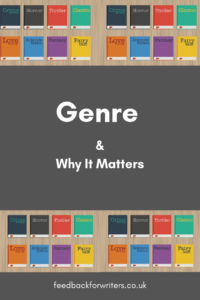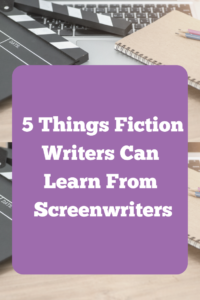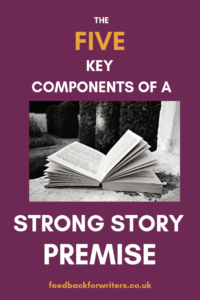 Genre is a key element I look at when I am feeding back on a story.
Genre is a key element I look at when I am feeding back on a story.
“Huh,” you may say. “Well, I am a Literary Writer. I do not “do” Genre.”
Uhhh, well, yes and no. Genre matters. Your work may well not fit into any of the main genre categories. It may be a more literary version of one of them – and there are plenty of big-name literary writers who lean towards certain genres. Or it might be a “pure” literary story. If that’s the case, the story will still have enough hallmarks of being literary for your readers to know that this is the type of story they are reading . From that, we can surmise some of the expectations both for and from the reader, and from that, if anything in your story feels “off”.
Genre Is About More Than Marketing
Why do human beings tell stories? We’ve done so now for thousands and thousands of years.
When I talk about genre and kinds of story, I don’t necessarily mean “templated” or “formulaic” or even highly commercial. Genre in practice is far more than a matter of the marketing categories that are used by commercial publishers or film producers.
That said, the lasting commercial categories – Romance, Horror, Action-Adventure, Comedy, Thriller, Mystery, Fantasy, Sci Fi, Crime, and all their subcategories – have lasted because people like them. And people like them because they have strong emotions at their core.
Some readers want a story that reminds them true love exists, and to invest in the will-they won’t-they of a couple. Or to have their deepest terrors presented to them, where they can safely experience the adrenaline of fear. Perhaps they like to accompany a protagonist on some wild adventure, or explore the wonder of alternate worlds. To experience where our current world may take us in future, or to imagine what our own lives in a past one might have been. Readers might enjoy working alongside a detective in solving a murder. Relating to a family saga, or laughing at familiar absurdities in life.
Other readers enjoy “difficult” books which make them think. Complex stories that that involve challenging assumptions, thinking deeply about philosophical questions, or exploring universal human truths. They might want a story told in a way that’s as structurally satisfying as the words are beautiful; they may experience what they read as a form of art.
Genre Tells Us How You Want The Reader To Feel
It’s worth asking yourself the following questions:
- What kind of story am I telling?
- Why have I decided to tell it this way?
- What impact do I want this to have on my reader?
- How would I like them to respond?
There’s a link between your work as it appears on the page and the reader you are hoping to engage. Your story is is a two-way interaction between you and them
Clear intent here is crucial. What do we want our story to do? Do we want to delight our readers with our cleverness and artistry? Skewer them with our insight and the beauty of our prose? Fool them with our dastardly red herrings? Make them cry or fill them with terror? Double them up with laughter? What?
Genre Sets Up Reader Expectations
It’s important to understand the expectations our readers might have when they read our work and if there is anything that will jar or spoil the experience we want them to have. All types of stories have expectations attached and certain conventions. We live in a world where we are surrounded by stories – we all know a lot about them, even if we don’t write them ourselves. We tend to know if something doesn’t quite work.
It can be good to subvert expectations where you can to avoid making your story boring or predictable. But some reader expectations based on our genre must be fulfilled for the story to work fully. Also our genres should be internally consistent. Vampire Horror Romance is fine. A vampire horror romance that turns into a crime caper halfway through, not so much.
A lot of the expectations are about how the reader should be feeling – a horror story should be scary, a thriller thrilling, and so on – but there are other elements at play.
Such As?
There has to be a point in a crime mystery where the villain is revealed, or all our guessing as readers will be in vain. We need to know if our adventure’s fighter wins or loses in the end, or returns home triumphant with their treasure. The lovers need obstacles between them and we want to know if they get together at the end. We must build up our glimpses of the monster in our horror and reveal it somehow in the end. With regard to endings, I would expect the more commercial stories to be tied up clearly in their closing scenes. With literary stories, that’s not the case. The key here is often to raise the right questions with the reader, not necessarily to give them answers. You want people to be thinking long after they’ve reached the end.
It’s worth studying the wider examples of the genre of stories you most like writing. Which conventions appear in your favourites time and time again?
Genre Affects Key Writing Decisions
The genre we choose, including hybrids and sub-genres, impacts every story decision. The story’s style, its narrative point of view. The characters – right down to character names. (Did you ever notice how many lead male protagonists in films are called Jack? Nigel doesn’t have the same ring to it, does it? Why is that?) The dialogue, the settings, the way the story is structured. The conventional plot points that your reader will expect – or that you might purposely subvert to lead your reader astray.
Take a ghost story, for example:
- It is often most effective to tell the story from the point of view of the haunting’s victim. It quite often connects with something about their character psychology or something in their past. However, there’s also another entire story running in the background – that of the ghost themselves and how they came to be. You may only give brief glimpses of that second story – but to make the story effective, as the writer, you need to know it. That way, you can drop those glimpses or clues in for the scares and to make sure they lead to the reveal at the end.
- A ghost story should be scary, or at the very least unsettling for the reader, as otherwise it will fail. You might use suspense techniques when you structure it in order to achieve this.
- It’s best not to make it gory – because grossing out your reader in a story like this is probably not your intended effect.
- You may well focus on a universal fear likely to be familiar to your reader, and will probably try to make your setting somehow off-kilter.
- Some of your characters might be odd, so we can’t be sure if our protagonist can trust them.
- You’ll probably build up the clues and tension until your reader finds out towards the end in the most dreadful way possible, what the ghost was all about.
- The protagonist might win or lose the battle. There needs to be a sense of peril and for the stakes to be high. You want these readers’ hearts to be thumping. You want to leave them lying awake at night.
Know Your Genre, Know Where Your Work Will Fit
No, it’s not all about the market – but some of it certainly is. Once you’re done, it’s good to know just where your work might fit in terms of getting it published.
Genres and particularly sub-genres and hybrids get added to and adapt all the time, depending on what’s going on in wider culture. Remember the crazes for YA Vampire Romances? BDSM erotica? Psychological domestic noirs with female protagonists and “Girl” in the title? Suspenseful mysteries with memory-addled protagonists? Trends change of course, and I wouldn’t advocate writing to a trend, but it helps to be aware of the work that is or isn’t similar to your own. That way you’ll know where to target your submissions and queries.
Over at writer subbing tracker Duotrope, for instance, there’s a huge range of genres you can filter by when you’re choosing where to send your work. I may not agree with all of the categories – I personally find a category of “Women’s Fiction” patronising – but it gives you a good idea of possibilities. For example, under the category of General Fiction, we have sub-genres like Bizarro, Gothic, Urban and Magical Realism. The Horror genre includes a huge list of sub-genres, like Vampire, Shapeshifter, Serial Killer and Supernatural, among many many others.
I hope I’ve convinced you that I consider a story’s genre for good reason. It tells me a heap of things when I’m thinking about how well a story’s working and what the cause of some problems may be. That said, I don’t believe in writers shoe-horning what they do naturally into overly rigid frameworks or writing in ways that are over formulaic. Balance is always needed. And make sure any genre you choose is the one that showcases your strengths as a writer. Any genre you write in should be mixed with your own personal quirks and ways of writing so you make sure you produce something truly unique.


 Screenwriters and fiction authors. One group writing to meet the often harsh demands of the film and TV industries, the other striving to create Booker-winning literary masterpieces. Different markets and forms, different audience. In other words – with about as much in common as cats and dogs. Or so you might think. What could one group of writers possibly have to teach the other?
Screenwriters and fiction authors. One group writing to meet the often harsh demands of the film and TV industries, the other striving to create Booker-winning literary masterpieces. Different markets and forms, different audience. In other words – with about as much in common as cats and dogs. Or so you might think. What could one group of writers possibly have to teach the other? 1. It’s All About The STORY
1. It’s All About The STORY
